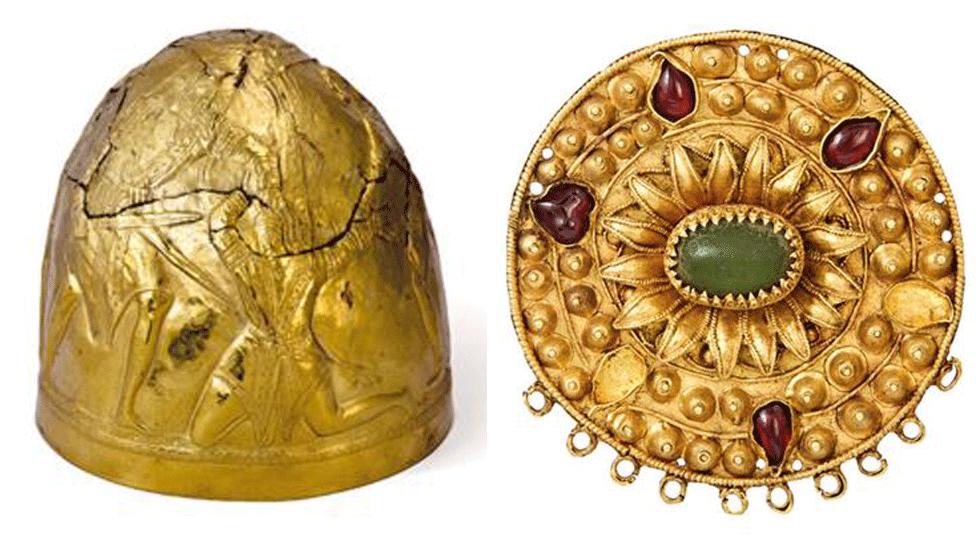Crimean gold must return to Ukraine - Dutch court
- Published

Included in the collection was a gold Scythian ceremonial helmet (L) dating back to the 4th Century BC
A Dutch appeals court has ruled in favour of Ukraine in a long-running wrangle over a historic collection of ancient treasures that was prompted by Russia's annexation of Crimea.
The legal dispute began in 2014 when four Crimean museums tried to force the Allard Pierson museum in Amsterdam to send the gold back.
Ukraine maintains the treasures, now held in storage, are state property.
The appeal court in Amsterdam on Tuesday agreed.
The museums, backed by Russia, could still take the case to the Supreme Court so there is little chance of the Scythian Gold collection being moved just yet.
The Allard Pierson museum said in a statement it was "pleased that a verdict has been reached and that another step has been taken towards the eventual completion of this case", but stressed it had no opinion on the appeal court's ruling.
The exhibition "Crimea - Gold and secrets of the Black Sea" went on display in Amsterdam in February 2014, the month that Ukraine's pro-Moscow president was ousted and Russian forces seized Crimea from Ukraine. A disputed referendum on annexation the following month was rejected by the EU and US as illegal.
The treasures were loaned by five museums, one in Ukraine's capital Kyiv and four in Crimea itself. They included a gold Scythian ceremonial helmet dating back to the 4th Century BC and other treasures from the era when the ancient Greeks colonised the Crimean peninsula.
Other items included a sword and scabbard
Ukrainian President Volodymyr Zelensky welcomed the appeal court's ruling: "We always regain what's ours. After the 'Scythian gold', we'll return Crimea," he said on Twitter. Foreign Minister Dmytro Kuleba said the gold was "coming home, to Ukraine".
Russia has insisted it is not part of the legal case, leaving it to the four museums to pursue their drive to have the treasures returned to the peninsula.
However, when the Amsterdam court said in 2016 it had based its decision on a 1970 Unesco treaty, the culture ministry in Moscow said the decision "grossly violates the principles of international exchanges between museums and the right of the people of Crimea to have access to their own cultural heritage".
"This is a pure manifestation of double standards and disregard for the cultural heritage of the peoples of Crimea," Andrei Malgin, the head of the Central Museum of Tavrida, told Tass news agency.
The appeal court said on Tuesday that it had based its decision on a 1995 Ukrainian Museum Act, which meant that the whole collection was part of Ukraine's cultural heritage.
As such it was irrelevant which museum owned the pieces as the law was intended to protect pieces that fell out of the state's sphere of influence.
Related topics
- Published8 June 2021
- Published23 December 2019